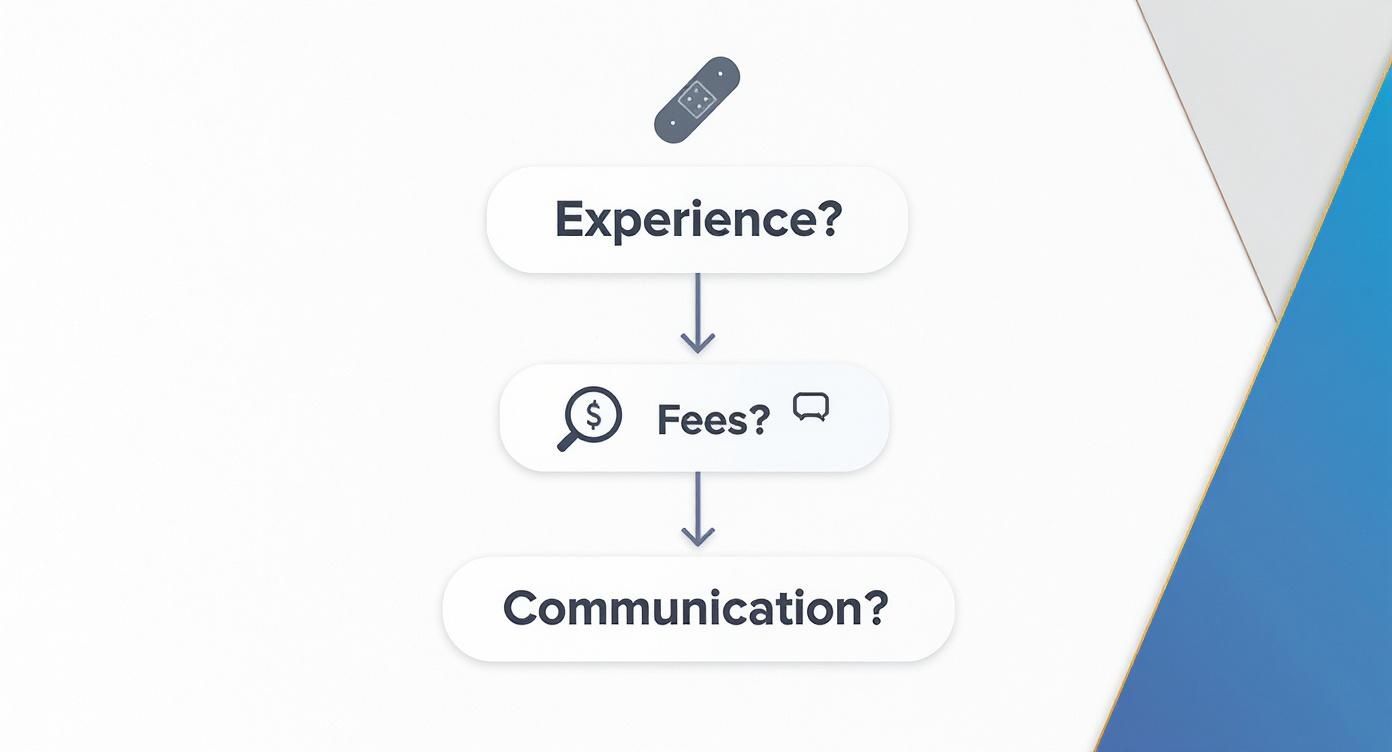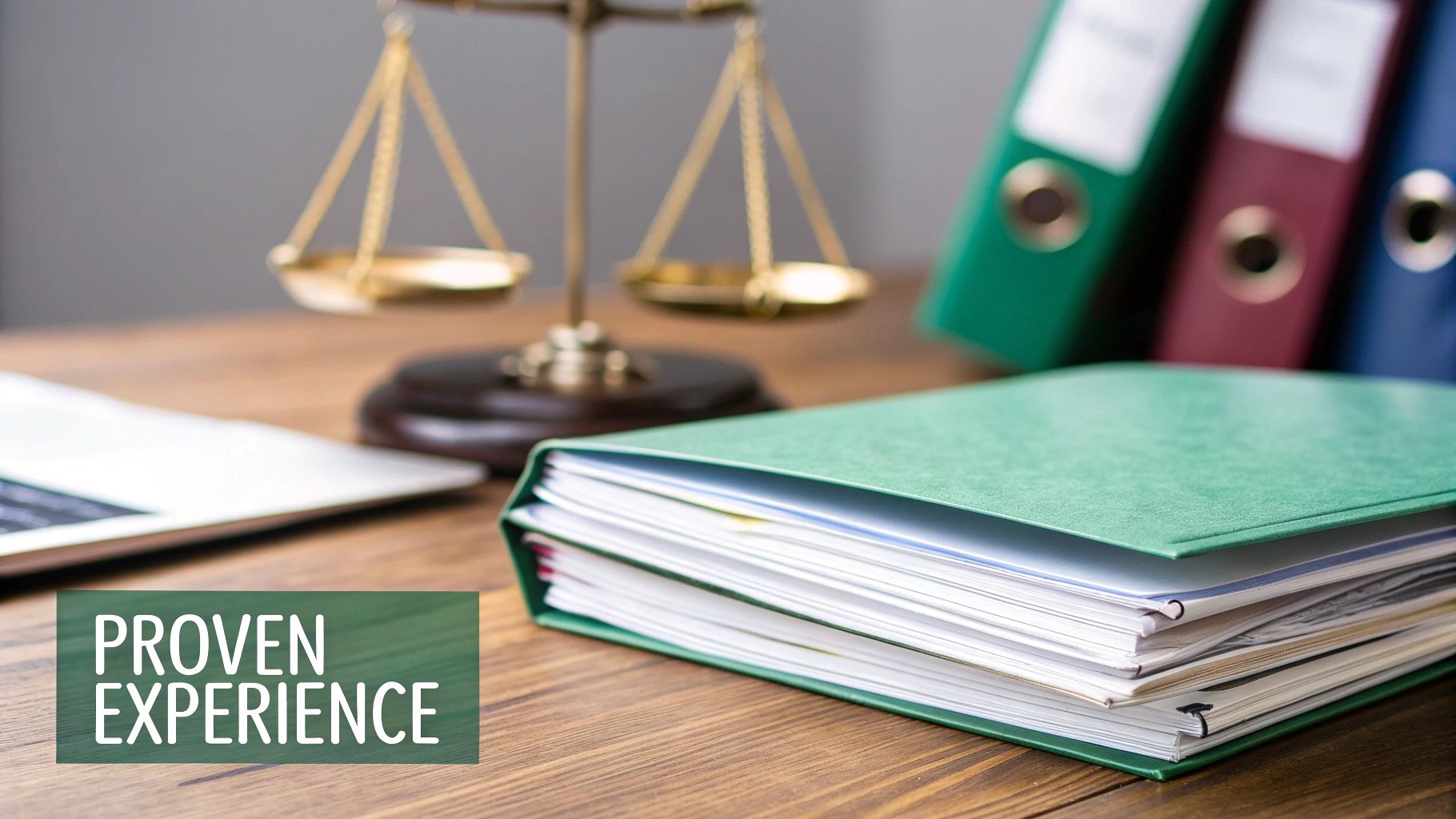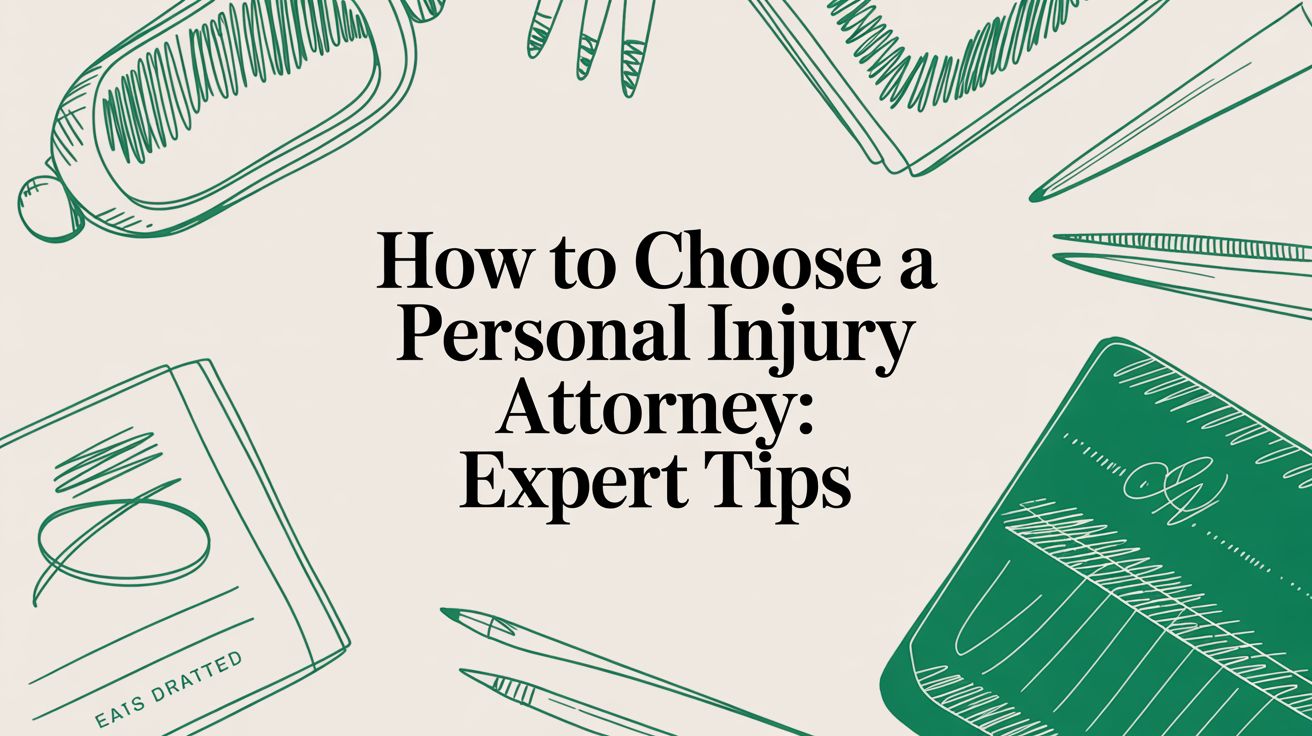Knowing how to choose a personal injury attorney is the most critical decision you’ll make after an accident. To get it right, focus on three key areas: their specific experience with cases like yours, a fee structure that is crystal clear, and a communication style that makes you feel heard and supported. This isn’t just about hiring a lawyer; it’s about finding a true advocate for your recovery.
Your First Crucial Decision After An Injury
After an accident, you’re suddenly dealing with medical appointments, lost wages, and the stress of a damaged car. The thought of a legal battle can feel overwhelming, but this is exactly when the right support makes all the difference.
Your attorney is your guide through this complex process. They will handle everything from documenting your injuries and losses to negotiating with insurance adjusters who are trained to minimize your payout.
A great lawyer builds a strong case that proves the other party was at fault and calculates the full extent of your damages. This includes things many people overlook, like filing a diminished value claim for your vehicle. If you’re unsure where to start, SnapClaim can connect you with a qualified diminished value claim lawyer who understands these specific challenges.
This infographic breaks down the key things to look for when you’re ready to choose.

As you can see, it all starts with vetting their experience. From there, you need to get a firm grasp on their fees and make sure their communication works for you. Nailing these three points sets your case up for success from day one.
Why the Right Attorney Matters for Vehicle Claims
A personal injury claim is about more than just your medical bills. If your car or truck was damaged, you are also owed compensation for its loss in value—even after it has been perfectly repaired. This is known as diminished value.
This is where a skilled attorney becomes invaluable:
- They See the Big Picture: A good lawyer won’t focus only on your medical treatment. They will fight for every penny you are owed, including property damage and the inherent drop in your car’s market value, often called the “car value after accident.”
- They Handle Tough Claims: Insurance companies often push back hard on diminished value claims. An experienced attorney has seen their tactics and knows how to counter them with hard evidence, like a certified appraisal report from SnapClaim.
- They Use Expert Resources: The best attorneys have a network of experts to strengthen your case. When it comes to your vehicle, they know a SnapClaim report provides the data-backed proof needed for a fair insurance total loss payout or diminished value settlement.
Here’s a quick summary of the essential traits to look for when choosing a personal injury attorney.
Key Attorney Qualities at a Glance
| Attribute | Why It Matters For Your Case |
|---|---|
| Specific Case Experience | You need someone who has won cases just like yours, not a generalist. |
| Transparent Fee Structure | A clear contingency fee agreement means no surprises and no upfront costs. |
| Strong Communication | You should feel comfortable asking questions and receive regular, clear updates. |
| Proven Track Record | Look for a history of successful settlements and trial verdicts. |
| Good Reputation | Check client reviews and peer ratings to gauge their standing in the community. |
Ultimately, these qualities separate the average attorneys from the great ones who will truly fight for your best interests.
Evaluating an Attorney’s Experience and Track Record
When you start searching for legal help, it’s tempting to think any lawyer with decades of practice is a safe bet. However, not all legal experience is equal, especially in personal injury law.
The key is to look past the years in business and focus on their specific history with cases similar to yours. A proven track record in the right niche is everything.

This isn’t just a hunch; it’s what clients demand. A recent survey showed that nearly 40% of people looking for a lawyer said relevant experience was their number one priority. Another 27% pointed to a proven track record of success, which tells you that real, tangible results are what matter most.
So, you need to dig deeper than their website’s homepage. An attorney who spends most of their time on real estate or family law is not the right choice for a complicated car accident claim, even if they’ve been a lawyer for 20 years.
The Specialist vs. The Generalist
Think of it like choosing a doctor. For a serious heart condition, you would see a cardiologist, not your general family practitioner. The same logic applies to law.
A dedicated personal injury specialist lives and breathes this area of law. They know the playbook insurance companies use to undervalue or deny claims because they’ve seen it thousands of times. They’ve spent their careers building specific strategies to fight back. This is especially true when a car insurance claim is denied, as a specialist knows exactly which legal steps to take.
On the other hand, a general practice lawyer might only handle a few injury cases a year. They lack the deep knowledge of niche statutes, critical case law, and subtle negotiation tactics that a specialist brings to the table.
Key Takeaway: An attorney’s specialization directly impacts their ability to anticipate challenges, build a strong case, and secure maximum compensation. For a personal injury claim, always choose a specialist.
How to Verify a Lawyer’s Track Record
Checking an attorney’s background is easier than you might think. Don’t just take their marketing at face value—do your homework to confirm their expertise and reputation.
Here are a few practical ways to vet them:
- Review Case Results and Testimonials: Look for specific examples of cases similar to yours on their website. While past success doesn’t guarantee a future outcome, it proves they have relevant experience. Client testimonials offer valuable insight into their communication style and client care.
- Check with the State Bar Association: Every lawyer must be licensed by their state’s bar association. You can visit the bar’s website to confirm they are in good standing and check for any public disciplinary actions.
- Ask Direct Questions During the Consultation: Don’t be afraid to ask tough, specific questions. Inquire about the percentage of their practice dedicated to personal injury and their history with your specific type of injury.
Choosing an attorney with a verifiable track record of success gives you invaluable confidence. It confirms you have a true advocate in your corner who has successfully handled these challenges before.
Decoding Attorney Fees and Financial Agreements
Let’s talk about money. Understanding legal fees shouldn’t be a mysterious or stressful part of the process. When you are learning how to choose a personal injury attorney, getting a straight answer on their financial agreement is just as critical as vetting their experience.
Most personal injury lawyers work on a contingency fee basis. In simple terms, this means you don’t pay them anything unless they win your case, either through a settlement or a court verdict. Their payment comes from a pre-agreed percentage of the money they recover for you.

This arrangement is beneficial because it gives anyone a fair chance at quality legal representation, regardless of their financial situation. It also ensures your attorney is fully motivated to get you the best possible outcome, as their success is directly tied to yours.
Understanding the Contingency Fee Structure
The industry standard for contingency fees typically ranges from 33% to 40% of the final settlement. This percentage can sometimes change if the case proceeds to a full trial, which involves significantly more work than settling out of court.
For a detailed breakdown, this guide on understanding accident lawyer fees is a fantastic resource. But the fee percentage isn’t the whole story. You also need to ask about case-related costs. These are the out-of-pocket expenses your lawyer covers to build and pursue your claim.
Common case costs can include:
- Court Filing Fees: Administrative charges for officially starting a lawsuit.
- Expert Witness Fees: Payments to specialists like doctors or accident reconstruction experts to testify on your behalf.
- Deposition Costs: Fees for court reporters and transcripts when questioning witnesses.
- Evidence Gathering: The cost of obtaining medical records, police reports, and other vital documents.
Crucial Question: You must ask if the attorney’s percentage is calculated before or after these costs are deducted from the settlement. This detail can significantly impact the final amount you receive.
Key Financial Questions for Your Consultation
Walk into your first meeting prepared to discuss finances. A reputable attorney will be transparent and happy to explain everything.
Here are the non-negotiable questions you need to ask:
- What is your exact contingency fee percentage?
- Does that percentage increase if my case goes to trial?
- Is your fee calculated before or after case expenses are deducted?
- What happens to the case costs if we don’t win? Am I responsible for them?
- Can you provide an estimate of the costs you expect for a case like mine?
- How will you keep me updated on expenses as they arise?
Getting clear answers ensures you can sign an agreement with full confidence, knowing exactly how every dollar will be handled.
Finding a Lawyer Who Actually Communicates
A personal injury case is a marathon, not a sprint. You need an attorney who is more than a legal expert; you need an accessible partner who keeps you informed. A strong client-attorney relationship is vital, and poor communication can make a stressful situation worse.
Beyond legal skills, an attorney’s ability to listen, explain complex topics clearly, and respond in a timely manner will define your experience. You should never feel like you’re a bother. The right lawyer makes you feel informed and respected.
Setting Clear Communication Expectations
Your first consultation is the perfect time to assess an attorney’s communication style. Do they listen to your story without interrupting? Can they explain legal terms like “statute of limitations” (the deadline to file a lawsuit) or “negligence” (failure to use reasonable care) in simple language?
This early interaction is a strong indicator of how they will communicate throughout your case. If they use heavy legal jargon or seem dismissive of your concerns, consider it a red flag.
A good attorney will be proactive about setting expectations. They should tell you:
- Who your main point of contact will be: Will you speak directly with the attorney or a paralegal?
- How often you can expect updates: Will they provide updates weekly, monthly, or only at major milestones?
- Their preferred communication method: Do they prefer email, phone calls, or a secure client portal?
Why Communication Matters in a Crowded Field
The legal field is highly competitive. In 2023, there were roughly 164,559 practicing personal injury lawyers in the U.S. alone. This means you have many options and don’t have to settle for someone who doesn’t prioritize clear communication. You can learn more about the scale of the personal injury legal market to understand your choices.
A lawyer who communicates well respects your role in the process. They understand that while they manage the legal strategy, you are the one living with the consequences. This partnership is built on trust, which is impossible without open dialogue.
If an attorney can’t clearly explain their plan or makes you feel rushed during your first meeting, imagine the frustration months from now when you have urgent questions about a settlement offer. Choosing a lawyer who values communication empowers you to be an active participant in your own case.
Essential Questions for Your First Consultation
Think of the initial consultation as your interview of the attorney. This is your opportunity to evaluate their strategy, assess their expertise, and see if their personality is a good fit before you commit.
Walking in prepared with the right questions will help you quickly identify who has the skills to handle your case and who is simply telling you what you want to hear.
The answers they provide (or fail to provide) will tell you everything you need to know about how to choose a personal injury attorney.

Questions About Their Experience and Focus
First, you need a specialist. An attorney who handles personal injury alongside several other practice areas may not have the deep knowledge required to fight insurance companies effectively.
- What percentage of your practice is dedicated to personal injury? You are looking for a figure above 75%. Anything less suggests they are likely a generalist.
- Have you handled cases like mine before? Ask about their experience with your specific type of injury or accident. Can they share a non-confidential example of their approach and the outcome?
- Who will actually be handling my case? It’s important to know if the experienced partner you’re meeting with will be doing the work or if they will assign your file to a junior associate.
Questions About Case Strategy and Resources
Next, get a feel for their game plan. You want a clear, confident strategy—not vague promises of a large settlement.
It’s also worth asking about their firm’s resources. The legal world is evolving. As of early 2025, around 37% of personal injury firms use AI tools for tasks like drafting correspondence (52%) or summarizing medical records (39%). A firm that invests in modern technology often operates more efficiently. You can see more trends in Casepeer’s personal injury statistics report.
- Based on what I’ve told you, what is your initial assessment of my case? A good lawyer should provide a candid evaluation of its potential strengths and weaknesses.
- What is your philosophy on settling versus going to trial? The ideal answer is that they prepare every case for trial, as this is what pressures insurance companies to offer a fair settlement.
- What resources can your firm bring to my case? Do they have a network of accident reconstructionists, medical experts, and financial analysts?
- How does your firm use technology to manage cases? This reveals a lot about their efficiency and how they will keep you informed.
Questions About Communication and Fees
Finally, get absolute clarity on their communication process and fee structure. This is where most client-attorney relationships break down. You should also have a basic understanding of what liability insurance covers to better follow the conversation about settlement funds.
Key Takeaway: A reputable attorney will have no problem answering these questions. If they become defensive, avoid the fee conversation, or provide vague responses, consider it a major red flag.
This meeting is your chance to find a real partner who will guide you through this difficult time. Use these questions as your roadmap to find an advocate who is experienced, strategic, and ready to fight for you.
FAQs: How to Choose a Personal Injury Attorney
Do I really need an attorney for a minor accident?
Even for “minor” accidents, consulting an attorney is wise. Some injuries, like whiplash, may not be apparent for days, and hidden vehicle damage can be costly. Accepting an early insurance offer without legal advice may prevent you from seeking further compensation if your expenses increase. A free consultation can help protect your rights.
How much does it cost to hire a personal injury lawyer?
Most personal injury attorneys work on a contingency fee basis, meaning you pay no upfront fees. The attorney’s fee is a percentage of the final settlement or award, typically 33-40%. If they don’t win your case, you owe them no legal fees. This aligns their interests with yours: they are motivated to secure the best possible outcome for you.
How long will my personal injury case take?
The timeline for a personal injury case varies greatly. A straightforward case with clear liability might settle in a few months, while a complex case involving serious injuries or a dispute over fault could take a year or more, especially if it goes to trial. A good attorney will provide a realistic timeline based on the specifics of your case.
What if the at-fault driver’s insurance denies my claim?
An insurance denial is not the final word. Insurers often deny valid claims hoping you will give up. An experienced attorney can challenge the denial by gathering evidence, negotiating with the insurer, and, if necessary, filing a lawsuit to fight for the compensation you deserve. This is where legal expertise becomes essential. For more detailed information, you can explore this ultimate guide on how to choose a personal injury lawyer.
At SnapClaim, we provide you and your attorney with the data-driven proof needed to support your vehicle damage claim. Whether you are dealing with a diminished value claim or a low insurance total loss payout, our certified appraisal reports provide the leverage to negotiate fairly.
Our work is backed by a Money-Back Guarantee: if your insurance recovery from the claim is less than $1,000, SnapClaim refunds the full appraisal fee—guaranteed.
Get your free estimate today or order a certified appraisal report to strengthen your insurance claim.
About SnapClaim
SnapClaim is a premier provider of expert diminished value and total loss appraisals. Our mission is to equip vehicle owners with clear, data-driven evidence to recover the full financial loss after an accident. Using advanced market analysis and industry expertise, we deliver accurate, defensible reports that help you negotiate confidently with insurance companies.
With a strong commitment to transparency and customer success, SnapClaim streamlines the claim process so you receive the compensation you rightfully deserve. Thousands of reports have been delivered to vehicle owners and law firms nationwide, with an average of $6,000+ in additional recovery per claim.
Why Trust This Guide
This guide was reviewed and verified by SnapClaim’s auto appraisers, who specialize in diminished value and total loss disputes.
Our team continually updates every article to reflect current insurer guidelines, valuation standards, and court-accepted appraisal practices, ensuring that you’re relying on information trusted by professionals nationwide.
Get Started Today
Whether you’re challenging a low total loss settlement or proving your vehicle’s post-repair loss in value, SnapClaim makes it simple to take the next step.
Generate a free diminished value or total loss estimate in minutes and see how much compensation you may be owed.
👉 Get your free estimate today


